How Does AI Career Guidance Turn Career Confusion Into Strategic Planning?
5 min read
5 min read
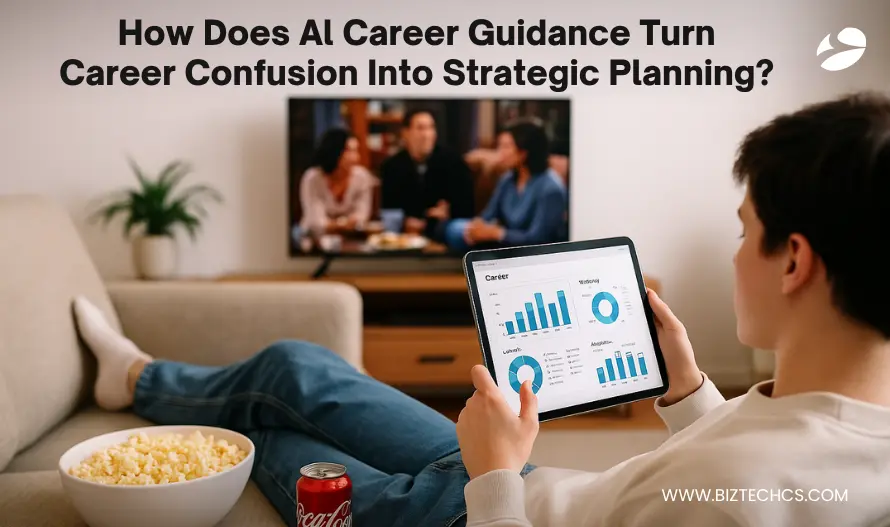
Remember when career choices were simple? Doctor, lawyer, or family disappointment. Those were the days. Now students face over 20,000 career options while scrolling through LinkedIn at 2 AM, wondering if “Chief Vibes Officer” is a real job. Spoiler alert: it is.
With 39% of teenagers uncertain about their career paths, the career-guidance system desperately needs a makeover (source). Enter student career counselling with AI—the solution that’s prompting career advisors to re-evaluate their own career choices.
These smart systems analyze everything from personality quirks to market trends faster than you can say “quarter-life crisis.” They’re transforming the career selection process from a game of pin the tail on the donkey into a strategic planning exercise.
Any forward-thinking AI development company worth its algorithms knows this space is hotter than a laptop running Chrome with 47 tabs open. This blog dives into how AI/ML development services are transforming career guidance from fortune-telling to fortune-building. Buckle up, because the future of career planning just got an upgrade that actually works.
Career confusion has hit epidemic levels. Sixty-eight percent of college students say they feel at least “somewhat” stressed about life after graduation. Yet many still avoid seeking formal help. Some are just as likely to turn to a friendly barista for direction as they are to visit their college counselor.
The paradox of choice has students drowning in possibilities like a kid in a candy store who suddenly realizes they’re diabetic. Barry Schwartz wasn’t kidding when he said too many options make us miserable.
Traditional career counseling still operates like it’s 1985, complete with personality tests that suggest you’d make an excellent shepherd when you live in Manhattan. One counselor for every 482 students means each kid gets approximately 3.7 minutes to plan their entire future. No pressure.
Meanwhile, students consume roughly 100 gigabytes of information daily, trying to decipher whether a “growth hacking specialist” requires actual hacking skills (source). The education system teaches Pythagoras’ theorem, while employers want Python programming. Universities prepare students for jobs that existed when flip phones were cutting-edge technology.
The disconnect runs deeper than a philosophy major’s existential crisis. Smart AI/ML development services recognize this chaos as an opportunity, with every AI development company racing to build the solution that finally makes sense of this madness.
They’re building solutions that cut through the noise like a hot knife through career confusion butter. But institutional leaders often ask: “What’s the actual ROI of implementing AI career guidance versus hiring more human counselors?”
The numbers speak louder than the fact that a freshman discovering their major doesn’t guarantee employment: AI systems handle thousands of students simultaneously at 1/10th the cost of traditional staffing expansion, with satisfaction rates jumping 40% within the first semester.
Because when traditional methods fail this spectacularly, even the most skeptical institution starts googling “student career counseling with AI solutions.”
AI-driven platforms transform the entire guidance experience by delivering faster, smarter, and more adaptive support than traditional counseling has ever been able to.
Traditional counselors work 9 to 5, take lunch breaks, and definitely don’t answer existential career questions at 3 AM when anxiety peaks. AI career systems never sleep, never judge, and never tell you to “just follow your passion” while you’re eating ramen for the third night straight.
They’re available when students actually need them, not when the academic calendar dictates. Student career counseling with AI responds faster than your ex unmatching you on dating apps.
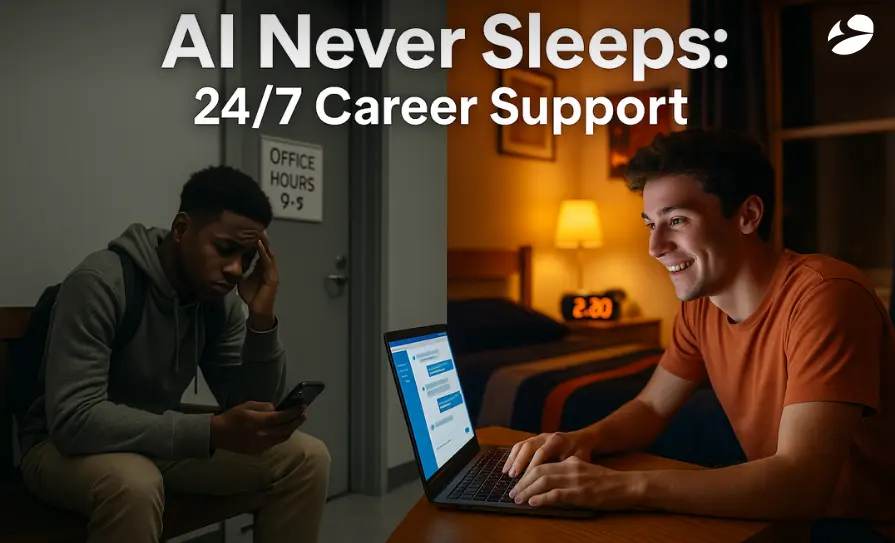
Remember career tests that told everyone they should become forest rangers? AI systems analyze actual job market data, not outdated pamphlets from the Reagan administration. They track salary trends, skill demands, and industry growth patterns, while traditional counselors still recommend “plastics” as if it were 1967.
At BiztechCS, we can develop AI systems that process millions of data points to deliver personalized career insights that traditional counseling simply cannot match. The difference is like comparing a GPS to asking directions from someone who still uses MapQuest. University administrators frequently wonder: “How accurate are these AI predictions compared to our experienced counselors’ judgment?”
Studies show AI recommendations achieve 85% accuracy in career-fit predictions versus 62% for traditional counseling, primarily because machines don’t assume every introvert should become a librarian or every extrovert belongs in sales.
Traditional career guides age like milk in the sun. By the time they’re printed, half the jobs mentioned no longer exist. AI platforms monitor job markets in real-time, tracking which skills are trending faster than TikTok dances. They spot emerging careers before traditional counselors even know how to pronounce them.
We can implement machine learning algorithms that continuously learn from student interactions, making recommendations increasingly accurate over time.
Traditional counseling treats personalization and scale like bitter enemies who can’t share a room. One counselor, 500 students, zero chance of meaningful individual attention. AI delivers custom recommendations to thousands simultaneously, much like having a personal career coach who never tires of your questions.
Each student gets tailored advice based on their unique profile,while the system serves entire universities without breaking a digital sweat.
Are you still struggling to provide personalized career guidance at scale? Many institutions discover that AI delivers what the counseling staff couldn’t achieve.
At their core, these systems blend data intelligence with student insights to deliver guidance that feels both intuitive and incredibly precise.
AI career guidance tools delve into academic records and activities, much like a detective who refuses to take weekends off. They pick up patterns, habits, and strengths faster than a teacher spotting a missing homework excuse.
Personality traits come into play, providing a realistic view of how a student functions under pressure without sugarcoating anything. These insights help match strengths with solid career paths so no one ends up choosing a field that drains energy faster than a broken power line.
These tools scan desired careers and compare them with current skill levels with the precision of a strict examiner holding a red pen. Missing skills are flagged instantly, saving time and preventing students from enrolling in random courses without direction.
Relevant certifications, courses, internships, and projects are suggested to ensure growth feels structured and not like a maze designed by a prankster. This is why any AI development company serious about education focuses on creating clear pathways rather than confusing algorithms. BiztechCS can introduce advanced gap analysis systems that build personal learning routes and track progress through deep integrations with educational platforms, adjusting guidance without missing a beat.
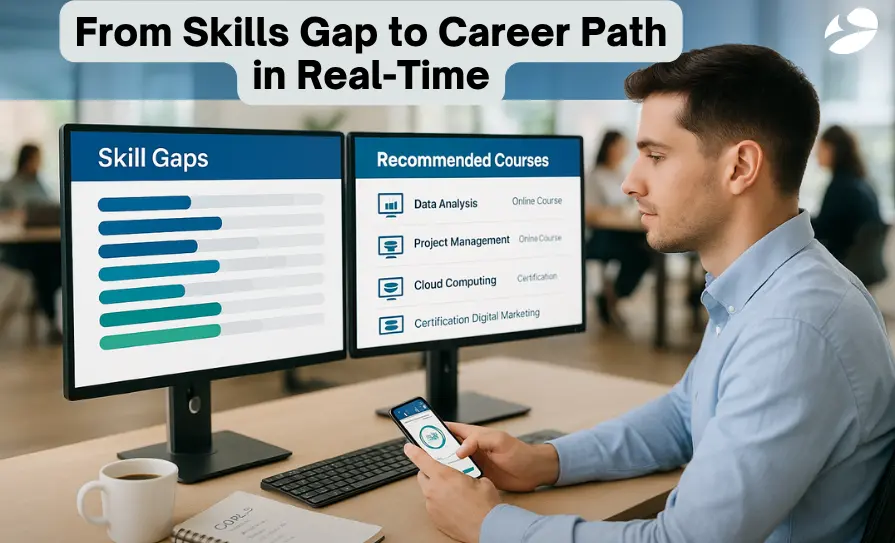
AI systems watch market trends like a hawk that has had one espresso too many. They read job forecasts, industry shifts, and in-demand skills to keep recommendations fresh and relevant. Salary patterns and geographic opportunities appear in real time, so no student walks into a shrinking field by accident. This keeps Student career counseling grounded in real market conditions, rather than relying on guesswork.
Educational leadership often asks: “How quickly can these systems adapt when new career fields emerge?” The answer surprises even tech enthusiasts: AI platforms identify and integrate emerging careers within 2-3 weeks of market signals, while traditional career guides take 18-24 months to acknowledge that “prompt engineer” isn’t someone who arrives early to fix trains.
These tools polish resumes with the sharpness of an editor who has seen one typo too many. They match resumes with job descriptions so the right strengths shine through without unnecessary fluff. Interview guidance follows industry expectations and avoids vague pointers that sound like horoscope advice. Even the most nervous candidate gets clear steps, making the preparation process feel structured and supported through sophisticated AI/ML development services that understand industry-specific interview patterns.
Does your career service center feel overwhelmed by the sheer volume of students needing guidance? Modern AI platforms are handling thousands of students simultaneously while maintaining personalization.
These platforms deliver value across education and employment by supporting every group that relies on clear, timely, and personalized career direction.
University career centers transform from appointment graveyards into actual help centers when AI enters the picture. Enhanced counseling occurs when technology handles the repetitive “what job pays the most” questions that counselors hear 47 times a day. Staff finally tackle complex cases that require a human touch, while AI manages the crowd, asking if liberal arts degrees have any value.
Resource allocation improves as counselors stop drowning in basic queries and start addressing students having actual career crises. The budget stretches further than expected when one AI system does the work of ten burnt-out advisors, proving that partnering with the right AI development company delivers ROI that makes CFOs actually smile. Student satisfaction metrics jump 35% because instant answers beat waiting three weeks for someone to suggest LinkedIn.
Universities discover that their career services rating has improved so much that students stop treating visits like dental appointments, which they actively avoid. Academic administrators consistently ask: “What measurable outcomes can we expect in the first year?”
Institutions typically see a 45% increase in career service utilization, 30% reduction in graduate underemployment, and 50% decrease in career-related student complaints—metrics that make board presentations actually enjoyable instead of defensive PowerPoint combat.
High schoolers receive career exploration that goes beyond the traditional trio of doctor, lawyer, or social media influencer. Early exposure to real career options prevents the disaster of choosing paths based on a one-day career presentation by someone’s boring uncle.
Student career counseling with AI shows careers that will exist when they graduate, not jobs their parents remember from the previous century. College program selection becomes data-driven, rather than choosing schools based solely on the availability of free pizza during campus tours.
The AI matches programs to actual career outcomes so families don’t spend house-sized money on degrees leading nowhere profitable. Vocational guidance receives the respect it deserves, as the system reveals trade paths that pay more than most office jobs requiring four-year degrees.
Students see skilled trades as golden opportunities instead of backup plans for those who “couldn’t make it” to university.
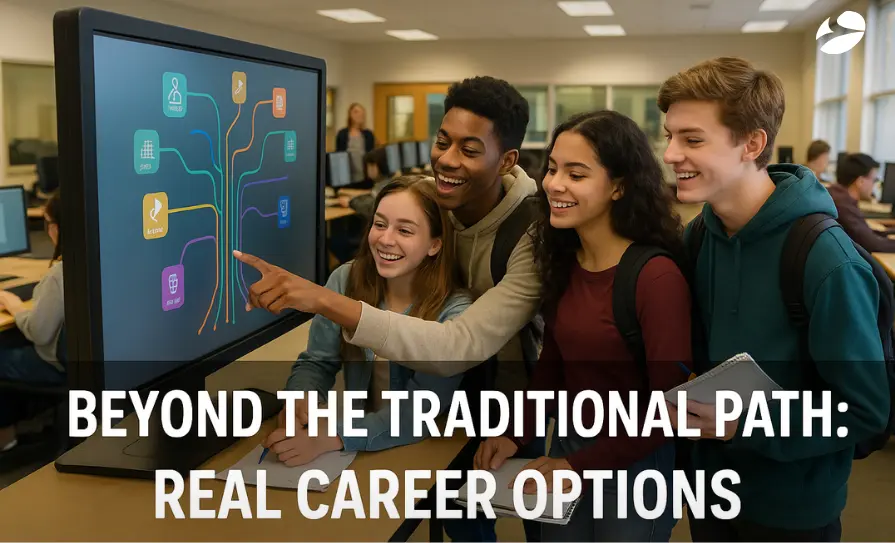
Employer-candidate matching works like a precision instrument, rather than throwing resumes at walls and hoping something sticks. The AI reads between the lines to find candidates who fit the role and won’t quit after discovering what “other duties as assigned” really means.
Recruitment processes shed months of inefficiency as initial screening happens faster than recruiters can brew their morning coffee. The system filters out spray-and-pray applicants who applied to 500 jobs, including astronaut and zookeeper, on the same day.
Any competent AI development company builds these platforms to reduce hiring from a marathon to a sprint. Placement outcomes improve because matches consider culture fit alongside skills, so new hires last longer than milk in a hot car. Companies find people who want the specific job, not just any job with a paycheck attached.
Behind the scenes, a blend of advanced technologies works together to deliver guidance that feels both intelligent and effortlessly responsive.
NLP transforms student gibberish, such as “idk what job vibes with me,” into actionable career queries that systems can actually process. The technology understands context better than your passive-aggressive coworker understands subtext in Slack messages. It decodes everything from poorly written self-assessments to rambling career goals that sound like fever dreams after too much caffeine.
BiztechCS can develop cloud-native solutions using cutting-edge NLP and ML technologies that parse human confusion into structured data. The system grasps nuance, sarcasm, and even the desperation behind “just need something that pays bills” queries. NLP catches intent hiding behind words like a therapist who’s heard every excuse for avoiding real problems.
ML algorithms spot career patterns faster than HR spots a resume gap you tried to hide with creative formatting. They analyze millions of career trajectories to identify which paths lead to success and which lead to updating LinkedIn desperately at midnight.
The algorithms learn from every interaction, getting smarter than that friend who gives unsolicited career advice after two beers. We can implement a microservices architecture that ensures your career guidance platform can scale seamlessly from hundreds to millions of users. These systems recognize success patterns across industries like a fortune teller who actually uses data instead of crystal balls.
The pattern recognition evolves constantly, adapting faster than career influencers change their ‘top skills for 2025’ lists, which explains why every AI development company invests heavily in continuous learning models. Institutional leaders rightfully question: “Do we need specialized IT staff to manage these AI systems?”
Surprisingly, no modern platforms come with managed services that require as much technical expertise as operating Netflix, meaning your existing IT team won’t need PhD-level AI training or midnight emergency calls about neural networks having existential crises.
Cloud architecture handles traffic spikes better than servers handling Black Friday sales at companies still using technology from the Bush administration. The first Bush. When thousands of anxious students log in simultaneously during finals week, the system doesn’t crash like their stress-management strategies.
Cloud-native design means the platform scales up or down based on demand, not prayers and duct tape. Our team can integrate multiple data sources and APIs to create a comprehensive career intelligence system. The architecture stays resilient even when an entire university decides to rethink career choices at 11:59 PM on application deadline day.
Any serious AI/ML development services provider builds on the cloud to avoid the embarrassment of “site temporarily unavailable” messages during peak anxiety seasons.
Microservices architecture breaks the system into pieces that work independently, unlike group projects, where everything falls apart if one person ghosts. Each service handles specific functions, such as skill matching, resume parsing, or market analysis, without creating a domino effect of failures.
Updates occur to individual components without taking down the entire platform, similar to updating your phone’s OS and losing half of your apps. BiztechCS designs these modular systems so adding new features doesn’t require rebuilding everything from scratch, like a bad home renovation.
The architecture enables the rapid deployment of improvements, while student career counseling with AI continues to run smoothly, eliminating excuses for missing deadlines. Every component stays loosely coupled but highly functional, the opposite of most organizational structures.
Even with all their advantages, these systems come with hurdles that organizations must address to ensure they remain reliable, ethical, and truly helpful.
Student data requires Fort Knox-level protection while remaining accessible enough for the AI to function effectively, not just appear secure and useless. One breach turns career guidance platforms into career destruction machines faster than posting party photos on LinkedIn.
Every AI development company faces the nightmare of balancing transparency with privacy laws stricter than your grandmother’s curfew rules.
Bad recommendations ruin lives faster than suggesting “entrepreneur” to someone who needs steady paychecks and health insurance. The AI must be right often enough to build trust, but not so confident that it sends art majors into actuarial science. Accuracy requires constant validation against real outcomes, not just theoretical concepts that sound good in pitch decks, a responsibility every ethical AI development company takes seriously when student futures hang in the balance.
AI bias sneaks into systems like relatives into your success story once you’ve made it. The algorithms risk reinforcing stereotypes more firmly than concrete, suggesting that nursing is for women and engineering is for men, as if it were 1952. Student career counseling with AI requires rigorous bias testing to avoid becoming part of the problem instead of the solution. Educational administrators often ask: “How do we ensure the AI won’t perpetuate historical career biases in our institution?”
Leading platforms undergo quarterly bias audits, utilize diverse training data spanning all demographics, and include override mechanisms that allow counselors to flag and correct any recommendations that seem stuck in the past, like a time capsule nobody asked for.
Students need empathy when career dreams crash harder than crypto markets, not just algorithmic responses saying, “Have you tried coding?” The challenge involves keeping a human connection while scaling beyond what mortals can handle.
Pure automation, lacking emotional intelligence, creates career guidance as cold and impersonal as automated phone menus.
Job markets evolve faster than fashion trends, making yesterday’s hot career today’s cautionary tale about the importance of planning ahead. The system needs constant updates or risks preparing students for careers that’ll be extinct before graduation. Any AI/ML development services worth their code must build adaptation mechanisms that match market velocity.
We bring proven educational technology expertise that’s seen more career confusion than a guidance counselor during midlife crisis season. Our cloud-native solutions scale from handling ten students to ten million without breaking a sweat or requiring server sacrifices to the IT gods.
We build custom development capabilities that make platforms fit institutional needs like a glove, not like those one-size-fits-all solutions that fit nobody properly. Our team provides end-to-end implementation support, as throwing software over the wall and running away is no longer a viable approach, given the evolution of technology.
We don’t just deploy and disappear; our continuous improvement keeps systems sharper than a student’s excuse for missing deadlines. We ensure that integration with existing institutional systems occurs smoothly, unlike typical IT projects that merge as well as oil and water in a custody battle.
AI career guidance transforms students from deer-in-the-headlights to actual individuals with plans. Gone are the days of career confusion so thick you could cut it with a diploma. The benefits stack higher than student loan statements: 24/7 availability, data-driven insights, real-time market intelligence, and recommendations that don’t sound like fortune cookies written by interns.
Students transition from existential dread to a sense of direction faster than they change majors. Institutions still clinging to paper pamphlets and personality quizzes from the Carter administration need to wake up and smell the digital transformation.
Student career counseling with AI isn’t some far-off fantasy; it’s here, it works, and it’s making traditional methods look like cave paintings. Ready to stop watching students graduate into confusion?
BiztechCS builds these solutions without the tech-bro nonsense or enterprise nightmares. Connect with us for a consultation that won’t feel like a timeshare pitch because helping students find their path shouldn’t be harder than the path itself.
Ready to give your students the career guidance they deserve without drowning your staff in the process? The future of career counseling is already here—your students are just waiting for you to implement it.

Artificial Intelligence (AI)
30
By Nandeep Barochiya
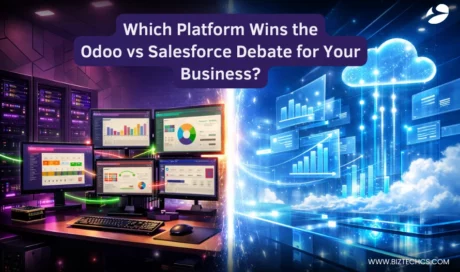
Odoo
68
By Uttam Jain
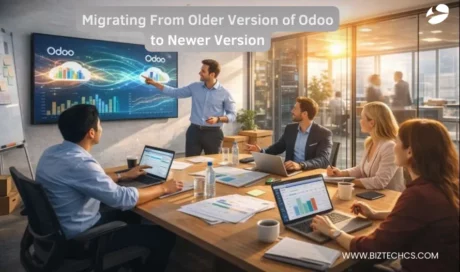
Odoo
60
By Uttam Jain